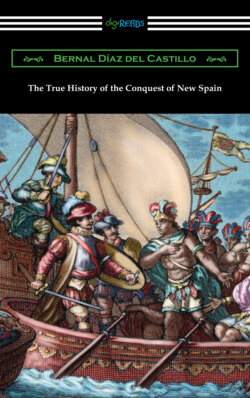Читать книгу The True History of the Conquest of New Spain - Bernal Diaz del Castillo - Страница 18
На сайте Литреса книга снята с продажи.
CHAPTER XII.
ОглавлениеWe come in sight of the town of Aguajaluco, and give it the name of La Rambla.
Having again re-embarked we continued our course along the coast, and perceived on the second day a town close to the sea shore, called Aguajaluco. We could discern numbers of Indians hurrying to and fro with huge shields made out of large tortoise-shells, which glittered so beautifully in the sun, that some of our men believed they were made of an inferior species of gold. The inhabitants appeared to be walking up and down the shore in great consternation, which induced us to call the village La Rambla, under which name it stands on the sea charts.
As we proceeded further along the coast we came to a bay, into which the river Tonola empties itself: it was this same river we entered on our subsequent voyage. We gave it the name of Sant Antonio, which it still retains on the maps. We next passed the mouth of the great river Guacasualco, and would gladly have run into the bay which it forms if contrary winds had not prevented us. We now came in sight of the great Snow Mountains—Sierras Nevadas. These are covered the whole year round with snow. There were also other mountains, nearer the coast, to which we gave the name of Holy Martin, because a soldier of the name of San Martino, a native of the Havannah, first descried them. One of the commanders, Pedro de Alvarado, whose vessel was the fastest sailer of the whole, being a great way ahead of the others, ran his ship up a river called by the natives Papalohuna: this we termed the Alvarado, after the name of the discoverer. Some Indian fishermen of the village Tlacotalpa gave him fish: we could perceive this, though at a great distance from him. Alvarado was followed by two more of our ships; we were therefore obliged to wait until they returned. This digression without the general’s leave occasioned ill blood; and Grijalva forbade Alvarado in future to sail in advance of the squadron, fearing he might meet with some accident or other before the rest could possibly come up to his assistance. From this time the four vessels kept close together. We soon after arrived at the mouth of another river, which we termed the Bandera’s Stream, (Flag Stream,) from the circumstance that the banks of the river were crowded with Indians bearing small flags of white cloth attached to their lances. They called out and invited us to come on shore: but I will relate in the next chapter what further took place here.
